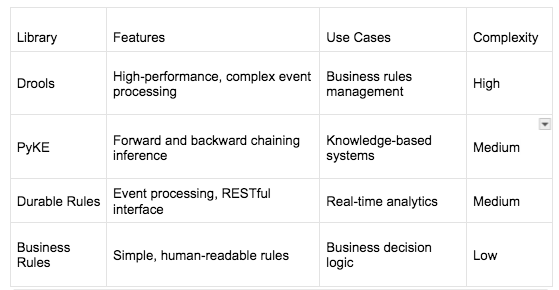Source: Python Rule Engine: Logic Automation & Examples | by Django Stars | Medium
Mar 27, 2024
Diving straight into the heart of today’s tech conundrum, the Python business rule engine is necessary for automating and enforcing complex logic across diverse applications. These powerful tools allow developers to define, modify, and execute rules without constantly tweaking the codebase.
Companies can streamline operations, enhance decision-making processes, and ultimately drive efficiency. Through this piece, I’ll share firsthand insights, underscored by case studies, and introduce a solution developed by our company that exemplifies the transformational impact of the rule-based engine Python.
Source: https://medium.com/@er.rameshkatiyar/what-is-rule-engine-86ea759ad97d
Things You Need to Know About Python Rule Engine
Rule engines automate decision processes by evaluating a set of rules against data. In Python, this is pivotal for applications requiring dynamic decision logic, such as fraud detection, business process management, and configuration engines. The essence of rule engines lies in their ability to abstract logic from code, making systems more adaptable and easier to support.
Automating logic with rule engines in Python brings numerous benefits. This includes increased agility, reduced development time, and improved scalability. It enables businesses to react swiftly to changes in business logic or regulatory requirements without deep dives into code, ensuring applications remain both flexible and robust.
Rule Representation in Python rule engine example
Python’s versatility allows for expressive rule definition by utilizing conditions and actions represented in a Pythonic way. This representation makes rules understandable, even for non-developers, fostering better community collaboration.
Rule Execution and Inference Mechanisms
The best rule engines for Python often employ forward chaining, backward chaining, or a combination of both to infer conclusions. This inference mechanism is crucial for executing complex decision trees and workflows, ensuring efficient and accurate outcomes.
Integration with Python Ecosystem
The integration capabilities of the Python rule engine with the broader ecosystem are unmatched. They can efficiently work alongside popular Python frameworks and libraries. This enhances functionality and enables developers to leverage the best of Python’s vast ecosystem.
Complexity and Technical Expertise
While rule engine Python offers robust features, they require a certain level of technical expertise to implement and manage effectively. Understanding the complexity and nuances of rule-based systems is essential for harnessing their full potential.
Python Rule Engine Libraries
Several Python libraries facilitate the development of rule-based systems. Each comes with its unique features and capabilities. Here’s a comparison to help you choose the right one for your needs:

Source: https://www.particle.io/blog/particles-rules-engine-is-now-open-source-and-available-to-all/
Possible Limitations of a Rule Engine
Despite their advantages, rule engines have limitations, including complexity in rule management, potential performance bottlenecks, and the learning curve for effectively utilizing them. Balancing the power of rule engines with these considerations is key to successful implementation.
Use Cases and Python Rule Engine Example
Python rule engines shine in scenarios requiring complex decision-making and logic automation, such as:
- Fraud Detection. Evaluating transaction patterns against fraud indicators.
- Content Recommendation. Matching user profiles with content attributes.
- Business Process Management. Automating workflow decisions based on dynamic rules.
Source: https://www.nected.ai/blog/python-rule-engines-automate-and-enforce-with-python
The Django Stars’ Experience in Python Rule Engine
Let me pull back the curtain on a fascinating episode from my time with the Django Stars team. We embarked on a project that felt more like solving a Rubik’s cube than your standard coding gig. Our client, Money Park, came to us with a head-scratcher: they needed a way for their managers to easily dictate automated actions on their platform like sending emails, creating notifications, that sort of thing — all through rules that anyone could understand, not just the IT crowd.
The Puzzle Piece: Human-Readable Rules
The crux of the challenge was converting statements like ‘(status = “processing”) and (order_type = “product_a”)’ or simpler ones like ‘(first_name=”John”)’ into Django ORM queries. It’s the kind of requirement that makes you appreciate the elegance and complexity of programming languages. Money Park’s platform was designed to smooth out the kinks in mortgage, investment, and retirement planning services, so loaning this right was crucial.
A Light in the Dark: Pyparsing
Our knight in shining armor was pyparsing — Python rule engine library I can’t sing enough praises about. It’s like having a universal translator for programming languages. With pyparsing, we were able to dissect these easy-to-read rules (e.g., JSON) and transform them into something Django’s ORM could digest and act upon.
Here’s a quick breakdown of how we did it:
- Operators and Literals. We started by defining our basic building blocks — equals, and, or — as operators with specific functions in our Django queries. It’s akin to teaching Django the language of our rules.
- Mapping Rules to Database Schema. Next, we established a dictionary of literals that mapped directly to our database fields. This step was about ensuring our rules would align with the actual data.
- Grammar Assembly. With our vocabulary set, we constructed the grammar of our rule engine. This part felt a bit like composing music, where each note had to harmonize with the next to post a coherent melody.
Translating Rules into Queries
The real magic happened when we converted these parsed rules into Q objects for Django. This was where our theoretical groundwork translated into practical API application, enabling dynamic query generation based on manager-defined rules. I was proud to see our solution in action, dynamically filtering data precisely.
The MVP Output
Our collaboration with Money Park culminated in an MVP that hit all the right notes. It was about empowering Money Park to fine-tune its platform with unparalleled agility. Our journey through testing and QA ensured that the platform wasn’t just functional but robust and reliable.
Conclusion
Rule engine Python examples represent a paradigm shift in approaching choice logic and automation. Their ability to drive efficiency, adaptability, and precision in applications cannot be overstated. At Django Stars, I’ve seen these systems’ impact firsthand and am eager to share my expertise. For deeper insights or consultations, feel free to contact our team.